Why Russia will lose this war?
Much of the "realist" discourse is about accepting Putin's victory, cuz it's *guaranteed*. But how do we know it is?
I'll argue that analysts 1) overrate Russian army 2) underrate Ukrainian one 3) misunderstand Russian strategy & political goals🧵
Much of the "realist" discourse is about accepting Putin's victory, cuz it's *guaranteed*. But how do we know it is?
I'll argue that analysts 1) overrate Russian army 2) underrate Ukrainian one 3) misunderstand Russian strategy & political goals🧵
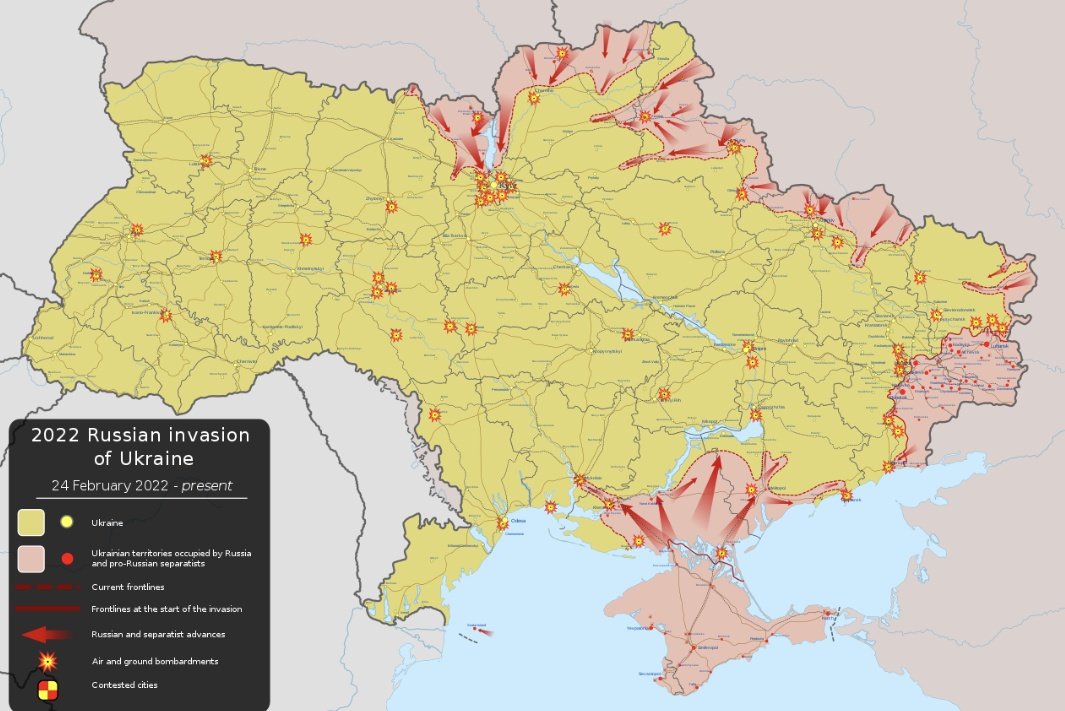
Consider a timely paper on Russian army by Bismarck Analysis. It's good & informative. It's correct on its land-based and artillery-centric character. It's also correct that Minister of Defence Serdyukov greatly increased army's efficiency in 2007-2012. But it's still misleading 
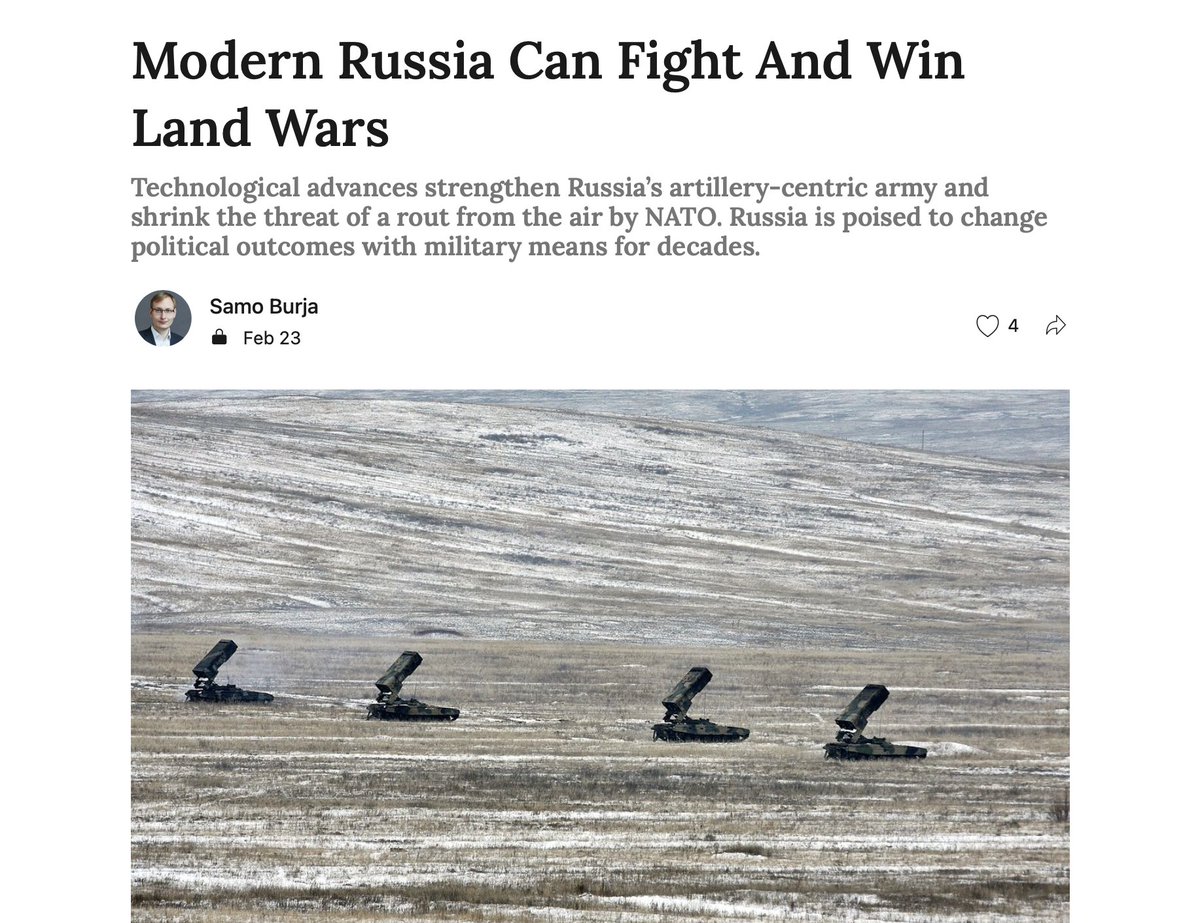
Yes, Minister Serdyukov indeed reformed the army. He increased its efficiency, fought with corrupt and crony armament producers improving the army supplies. As a result he became extremely unpopular, made tons of powerful enemies and was ousted in 2012 losing his power and status 
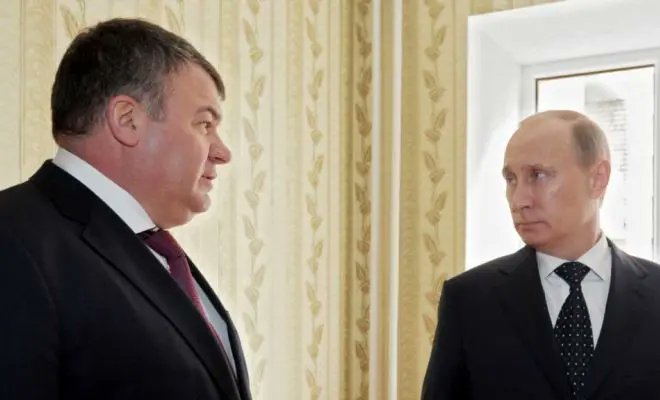
His successor Shoygu knew better than that. Now who's Shoygu? Shoygu is the *only* single Russian minister who uninterruptedly worked in government since 1991, since the very beginning of Russian Federation. He worked for all presidents, all prime ministers avoided all purges 
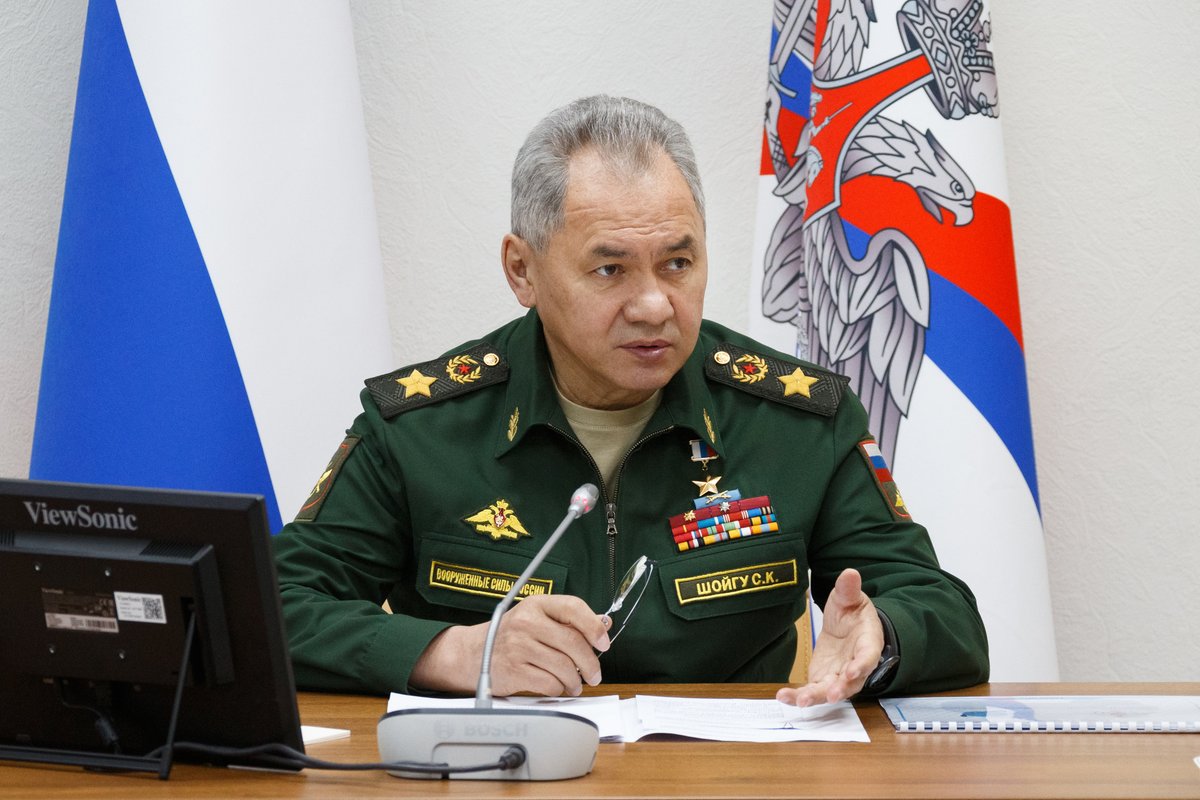
What does it mean? It means he's a cunning political entrepreneur, great in court politics, publicity, image. You survive every single administration by maxing your political survival. And to max it you need to minimise animosity. So you never object to powerful interest groups 

Serdyukov fought with interest groups and was destroyed. Shoygu was smarter than that. He launched a PR campaign presenting himself as the "saviour" from the Serdyukov's legacy. Whatever his predecessor did, was dismantled. Media cheered, people cheered, interest groups cheered 

That's a very, very typical problem. Efficiency-maxing requires ruthlessness in dealing with established elites and interest groups. Meanwhile court-politics-maxing requires pondering to them and not making enemies. Serdyukov was maxing efficiency, Shoygu - court politics 
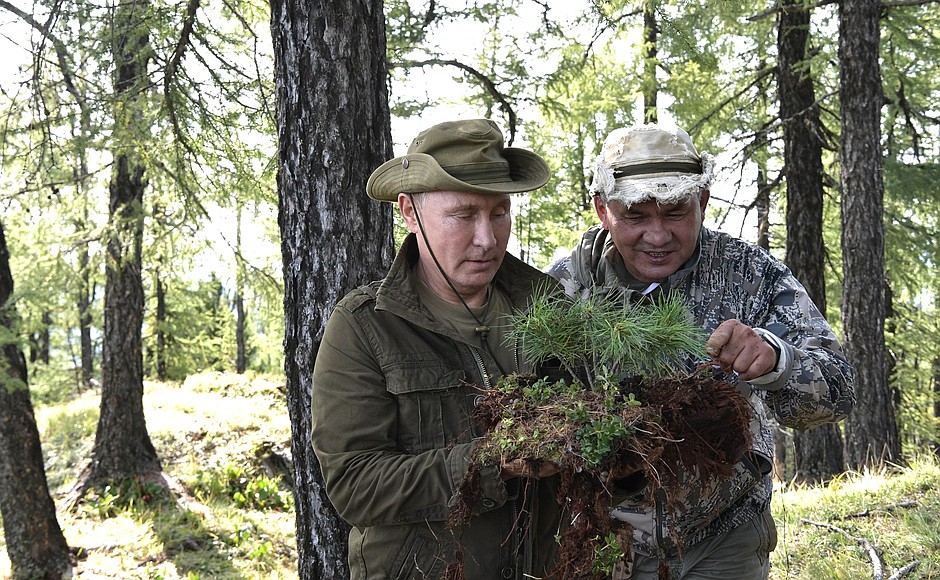
There was another issue. Shoygu is ethnic Tuvan. In such a country as Russia minority member can hardly become the supreme leader. People don't perceive him as ethnic Russian (see his palace) which means he's not dangerous for the leader and you can safely delegate him the army 
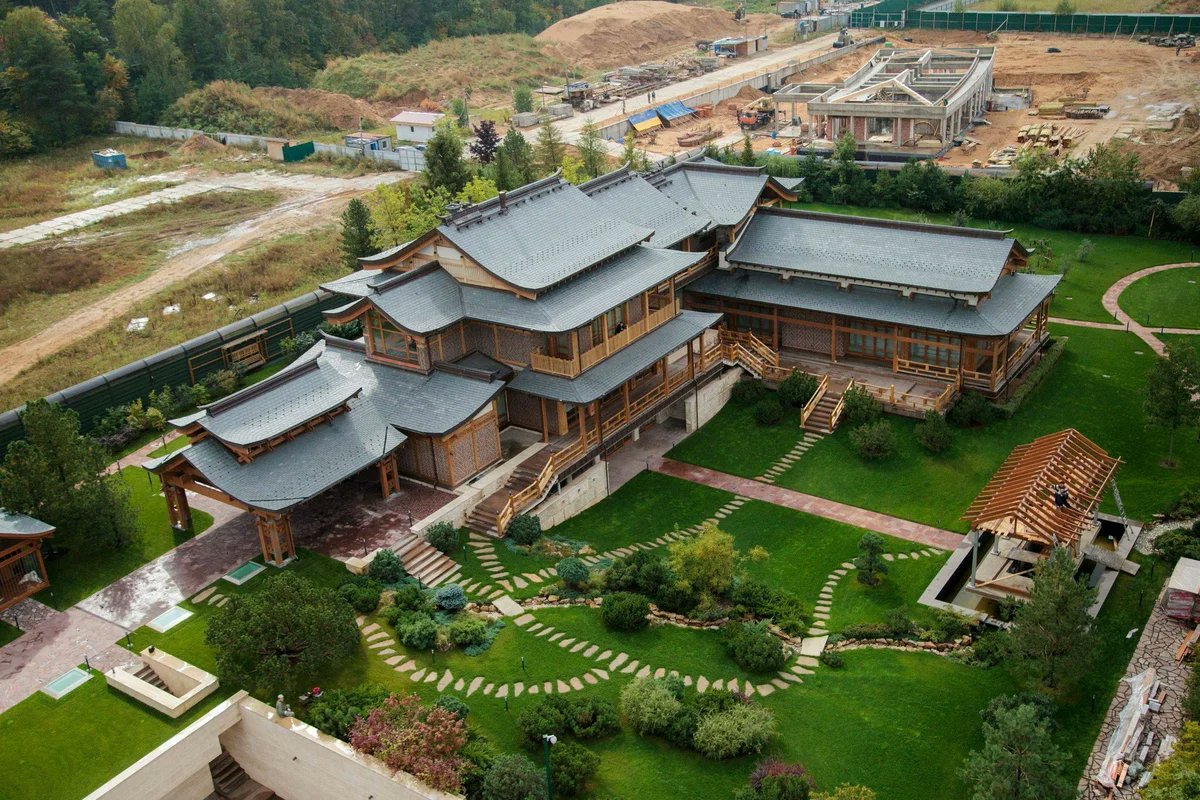
Shoygy not only purged Serdyukov's appointees, pondered to old military establishment, stopped arguing with army suppliers about the equipment cost and quality. He also pondered to numerous feel-good-lies regarding the Russian big strategy. Let's consider the army vs navy problem 
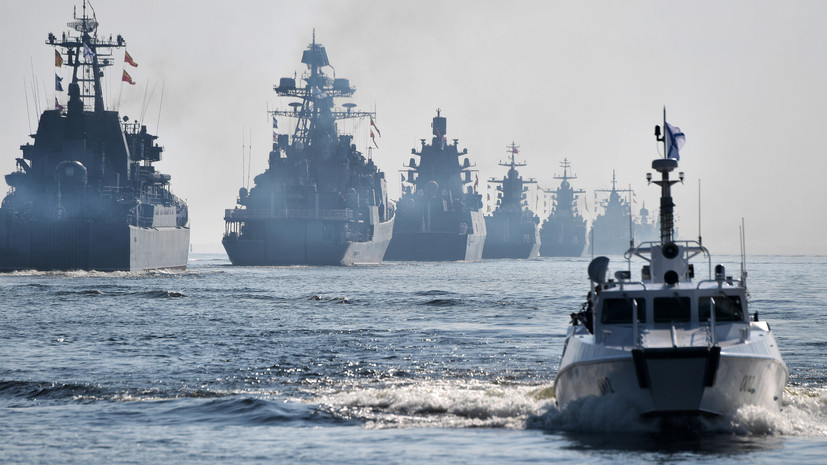
Army vs navy had been a traditional dilemma of European powers for centuries. As a rule, you couldn't support both first class army and first class navy, you had to choose. Some powers ignored this to their demise - like 17-18th cc France. Others were more rational, like Prussia 

We kinda forgot it but in the 17th c principality of Brandenburg centered in Berlin tried to play into a "global maritime power". They built a navy, established colonies in Caribbean and Africa (red). Super costly, super hubris, super stupid. Consumed tons of resources in vain 
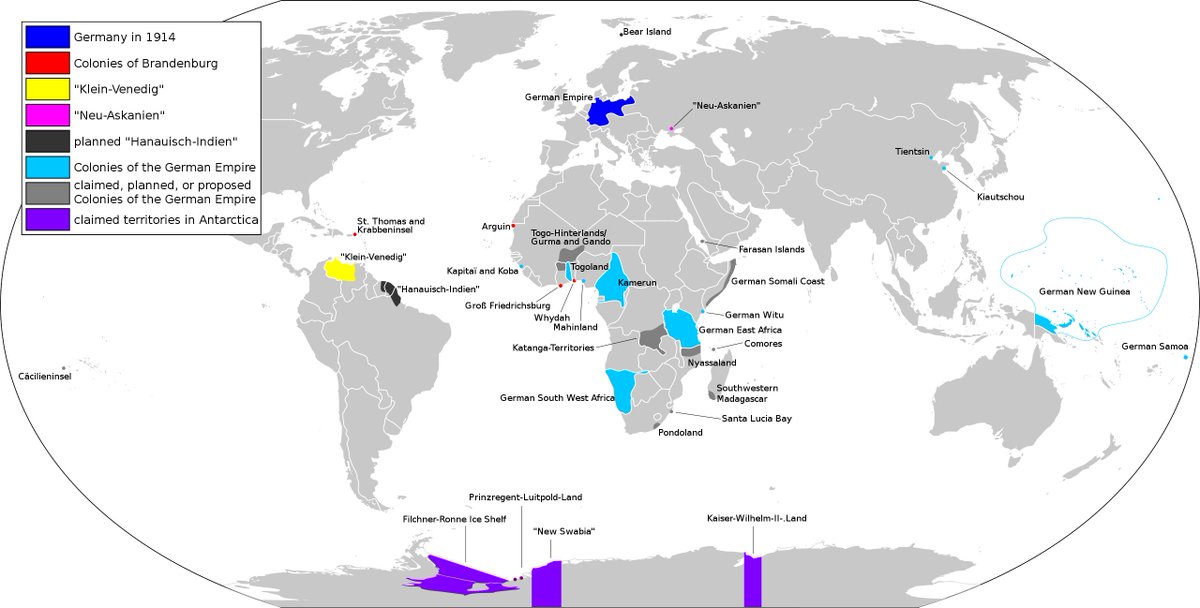
In 18th c. they reconsidered. They sold their colonies, dismantled the navy and started land-maxing. They correctly realised that if they suppress their hubris and minimise the navy (to zero), they can land-max and build the first class army. Which would then unify Germany 

So. Land-maxing requires minimising the naval ambition. Does Russia minimise its naval ambition? No. It feels obliged to maintain as much Soviet naval legacy as possible. Keep old ships afloat, build new ones, maintain and expand infrastructure for the ocean navy 
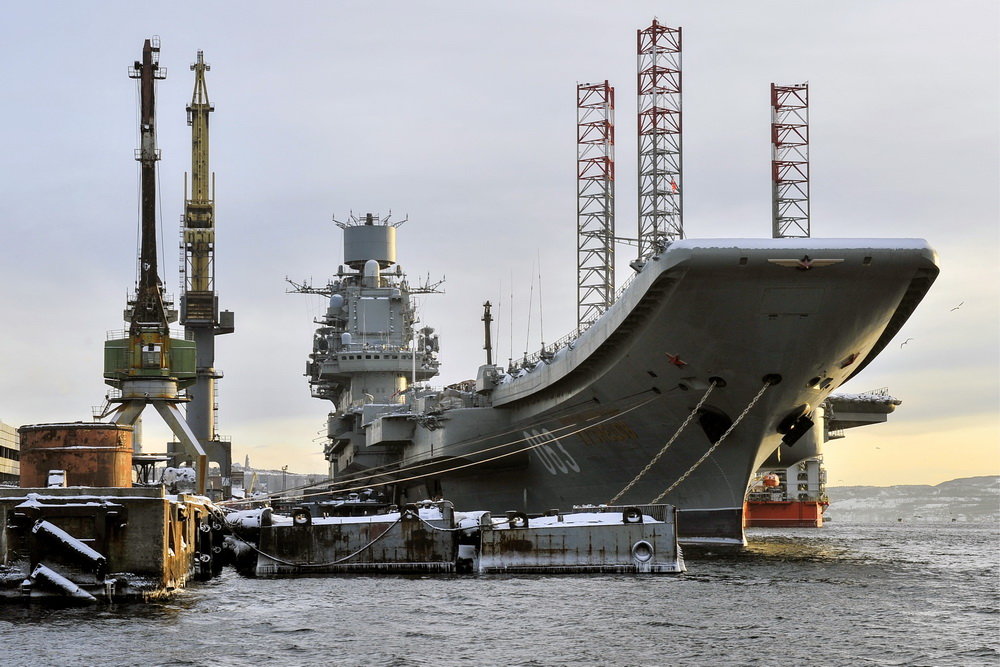
Here is another dilemma. Regional fleets can be effectively used in land wars. For example, Russia declared "navy manoeuvres" and then attacked Ukraine from the sea. That's cheap and effective. But keeping a regional fleet doesn't sound sexy. It's efficiency-maxing, not PR-maxing 

And Russia is PR-maxing. Putin declared that the share of new ships should reach 70% by 2027. Old Soviet ships are becoming obsolete, Russia's building new ones. BUT. Major Soviet shipyards are located in Ukraine. So now Russia expands shipyard infrastructure to reach this goal 
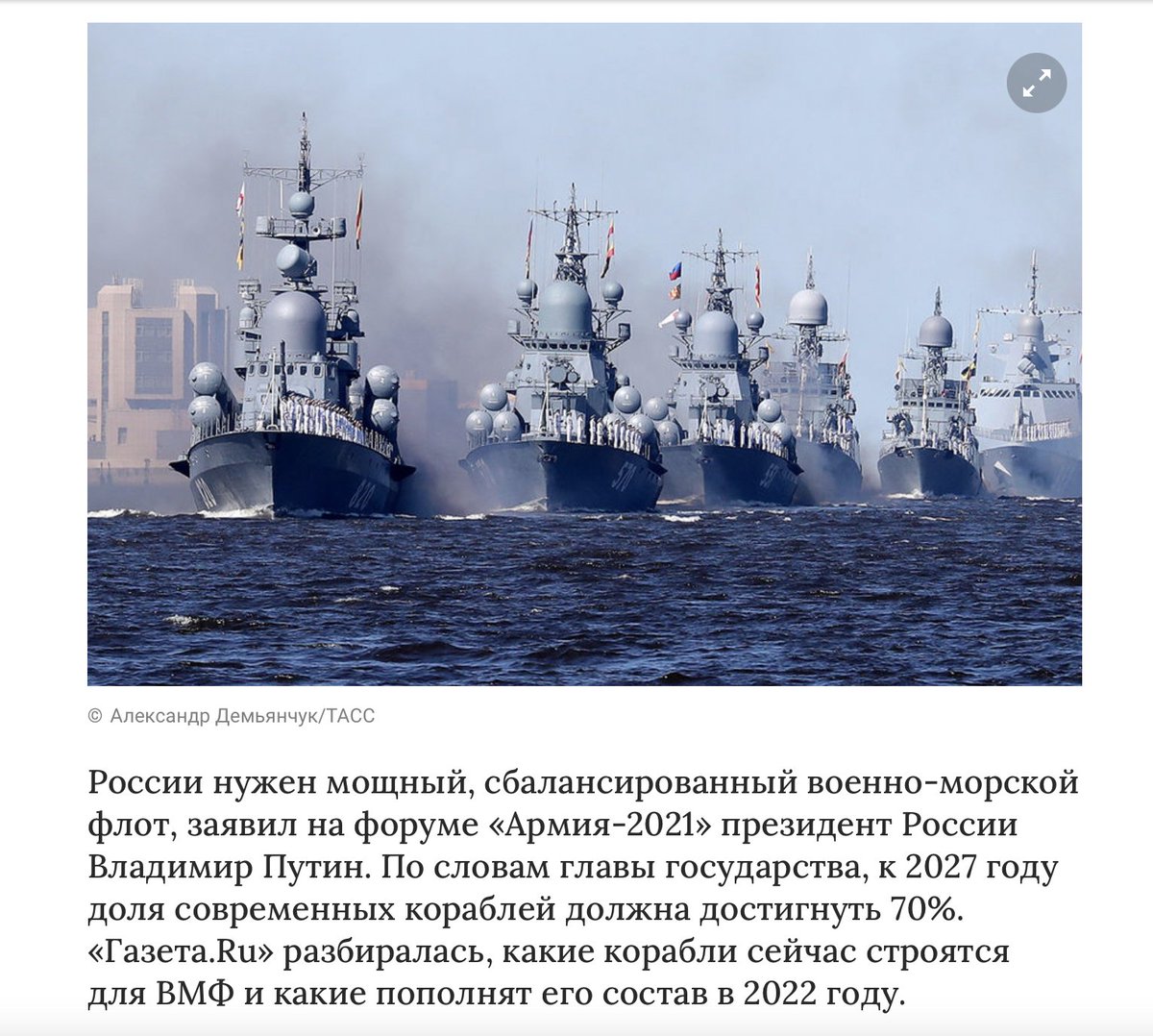
Soviet naval legacy is a curse of Russian military. USSR could afford ocean fleets with carrier strike group. Russia can't. But abandoning Soviet ambitions would require suppressing their own hubris (impossible). So they strive to maintain it. Ergo: they can't and won't land-max 
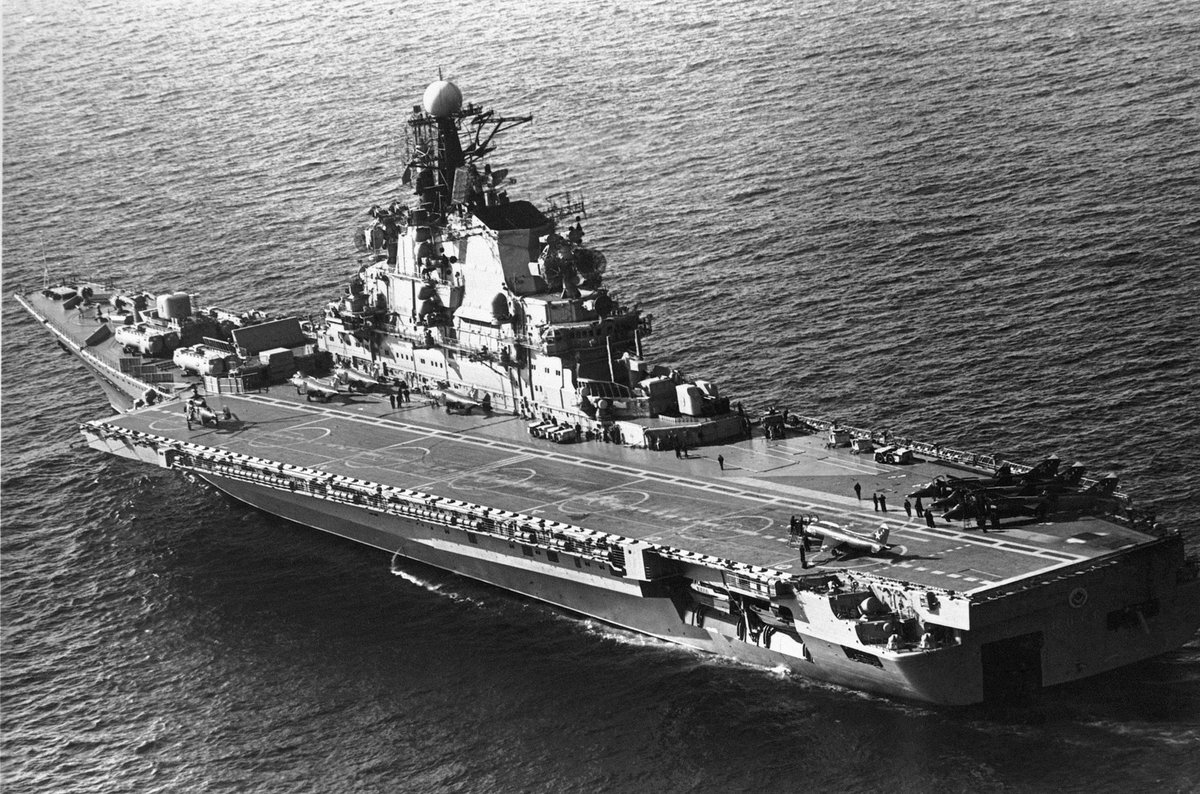
How does it reflect on this war? First, Russian invading force is small. It has LOTS of artillery ofc. But it's not numerous enough to win. Pro-Russian analysts compare their advance with Barbarossa. But unlike Wehrmacht in 1941 Russian invaders have only *ONE ECHELON OF TROUPS* 
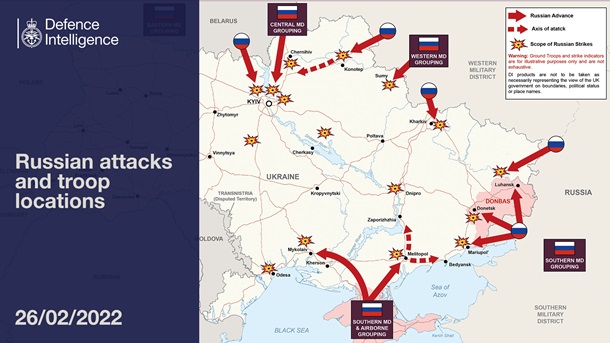
How is a Blitzkrieg organised? By echelons. First echelon is moving forward as fast as they can. Ofc this means that lots of defenders will be left in their rear. But then the second echelon comes, then third, etc. They finish defenders, occupy territory, control the supply lines 

If Russia launched a proper Barbarossa-style Blitzkrieg that would happen now - first, second, third echelons. But the second echelon didn't come. It never existed. Why? First, Russia's *not* landmaxing and thus doesn't have so much resources and infrastructure for the land war
Secondly, launching several echelons would require long arduous preparation. You need to mobilise them, move to the borders, quarter, maintain and supply. It's not that easy. It's a hard job that should have been done well in advance to wage a Blitzkrieg. And it hadn't been done
Why Russia didn't prepare a proper Blitzkrieg? And now we come for the third and main reason. Blitzkrieg is a war strategy. Blitzkrieg is how you break & suppress the enemy who's actually fighting. Russia didn't plan it because it didn't plan a war. It planned a Special Operation 
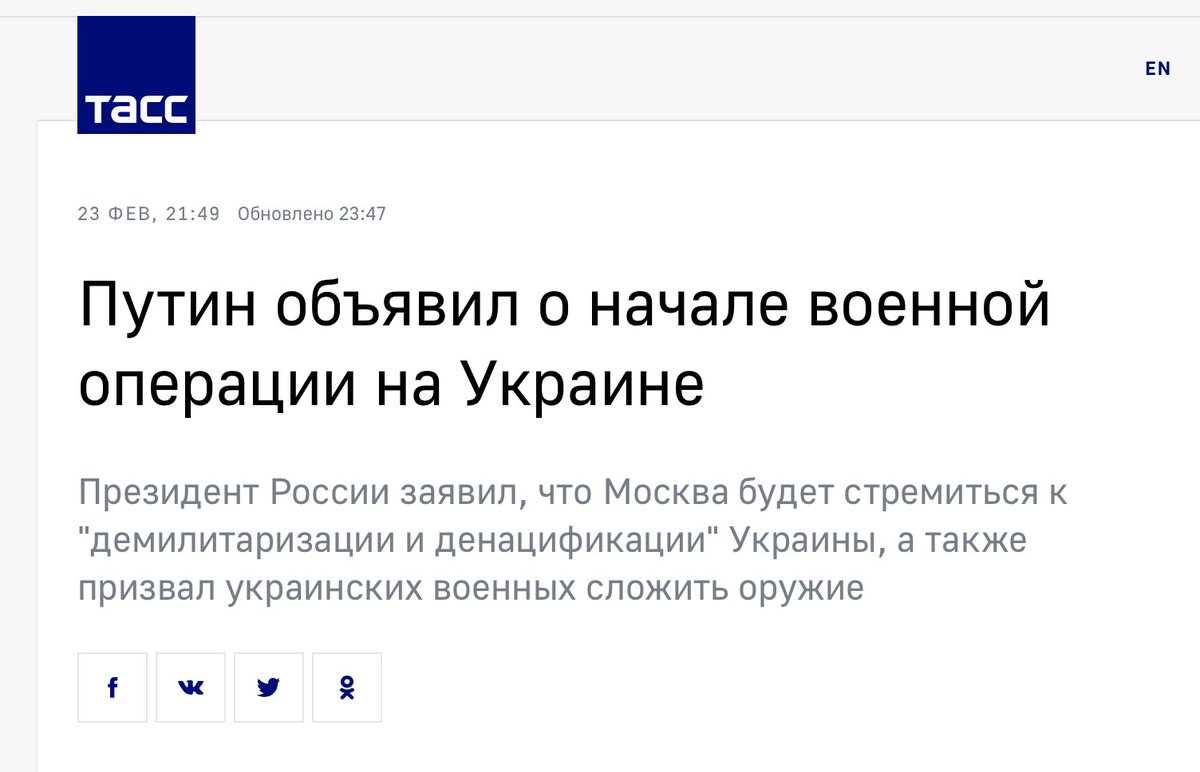
Ofc partially that's just modern discourse. After WWII traditional understanding of sovereignty as of legal right of sovereign rulers to wage offensive war died. As a result modern states never admit they're waging wars. They're waging "pacifications", "counterterrorism", etc
Consider how all the War Departments and Ministries over the world were renamed into "Defence" in late 1940s. Everyone's defending, nobody's attacking. Why does the fighting happen then? Well, because of criminals - "bandits", "terrorists", "jihadees" or as now in Ukraine "Nazis"
Modern world abolished the distinction between the enemy and the criminal, a key idea of the Roman Law. Powers do wage wars, but to do so they need to criminalise and dehumanise their enemies. Hence, all the "terrorist" discourse. In a sense Putin is going with the flow
But on a deeper level Putin is absolutely correct. His declaration of "special operation" in Ukraine is sincere, because he didn't expect the war. He doesn't know how to do wars. For all of his life he's been organising and launching the special operations
First, as a KGB officer. Then, as St Petersburg city councillor for foreign affairs (= illegally selling Soviet warehouse stuff to the West). In 1990s he closely worked with the criminal world and he did it successfully. Here you see him with a thief-in-law, Grandpa Hassan 
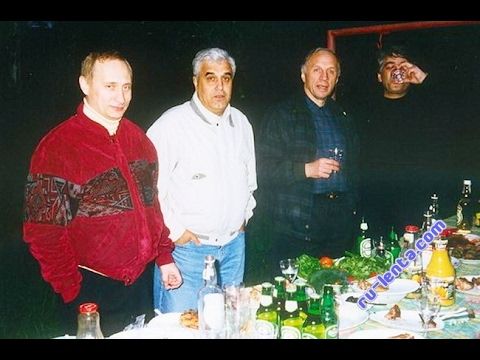
Btw that's how Putin's pal Grandpa Hassan is celebrating with his close circle. It gives some idea of Putin's business partners and associates
Putin worked with violent entrepreneurs used to killing. But. He had always had the upper hand. Federal and regional governments were very much stronger than these criminal bosses who were very much replaceable. Everyone of them had dozens of henchmen who wanted to take his place
Putin waged special operations when he had much stronger position than these criminals. And he got used to that. Later Yeltsin chose him as a successor and in this capacity Putin launched a bunch of special operations to consolidate power. Again with full support of higher ups 
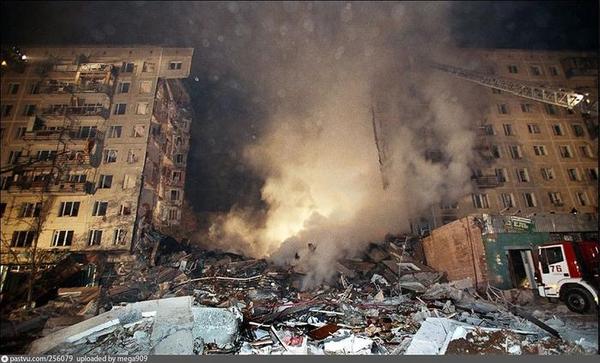
Yeah, Putin played badass even before becoming a President. But it was easy to play a badass when he was backed up by then President and the entire apparatus of Kremlin. Huge power, no risk, no accountability 
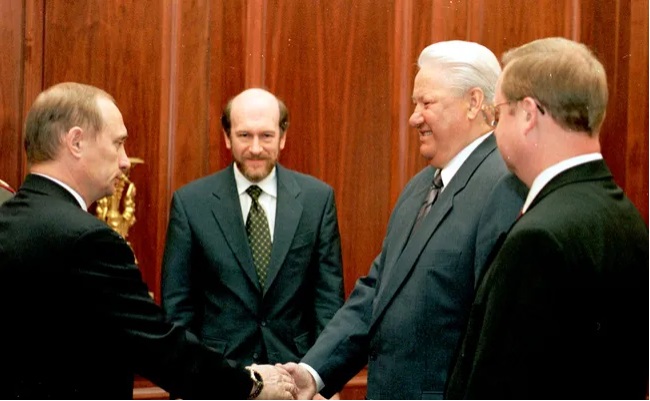
Later he initiated conflicts each time his had to boost his popularity and tough image. Chechnya, Georgia, Syria. But neither of this was a war. Every conflict was a Special operation waged:
1) for political goals
2) against small force which had no chance to win against Russia
1) for political goals
2) against small force which had no chance to win against Russia

Putin fought only with small countries. Chechnya - 1 million people, Georgia - 4. Syria had more, but he fought with rebels, with no proper training or armaments. Also "counterterrorist" discourse allowed Russians to simply level entire cities to the ground with no consequences 

Every time Putin needed to confirm his alpha status he would devastate some little country with a Special Operation. They didn't require proper preparation because they bore no existential risk to Russia or to him. Like, the fuck they're gonna do? No risk = no need to bother 
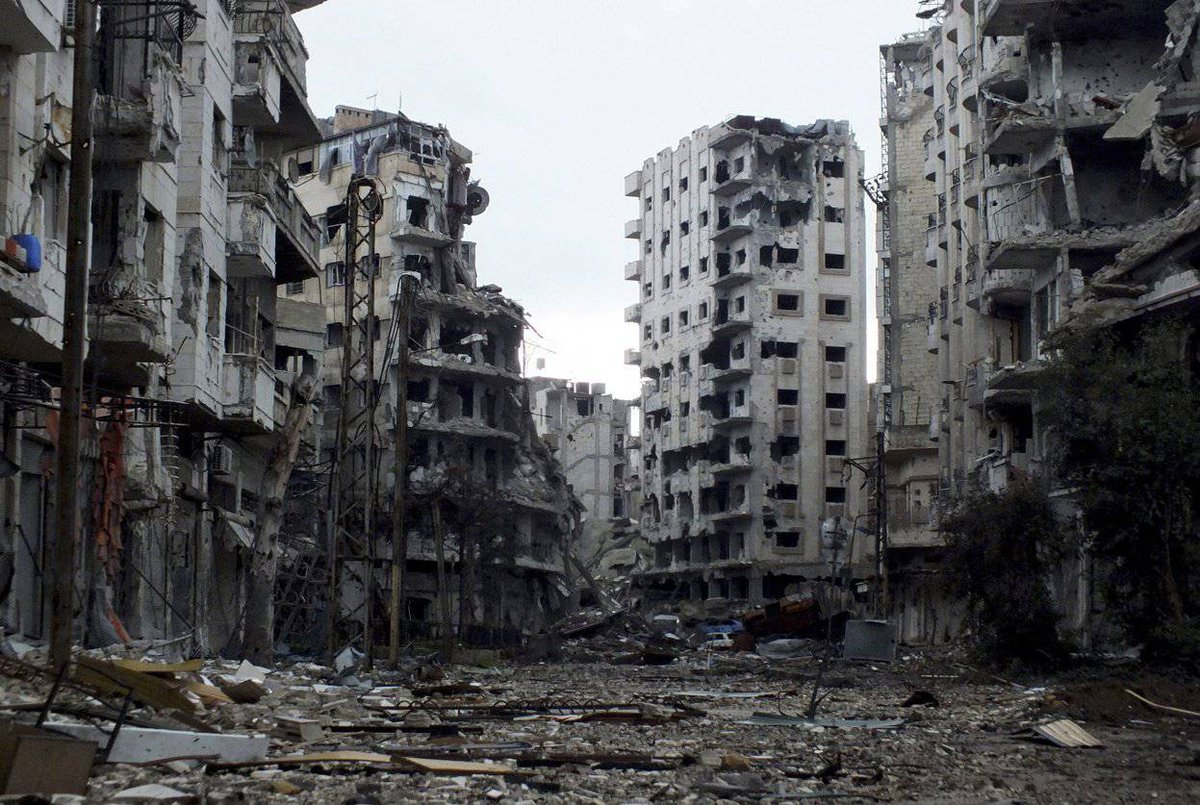
Putin decided to repeat this little trick again. Hence, not that numerous army of invasion, only one echelon of advance, etc. But Ukraine is much bigger - it has 44 million people. What was Putin thinking? Apparently he was expecting zero resistance from the Ukrainian army 
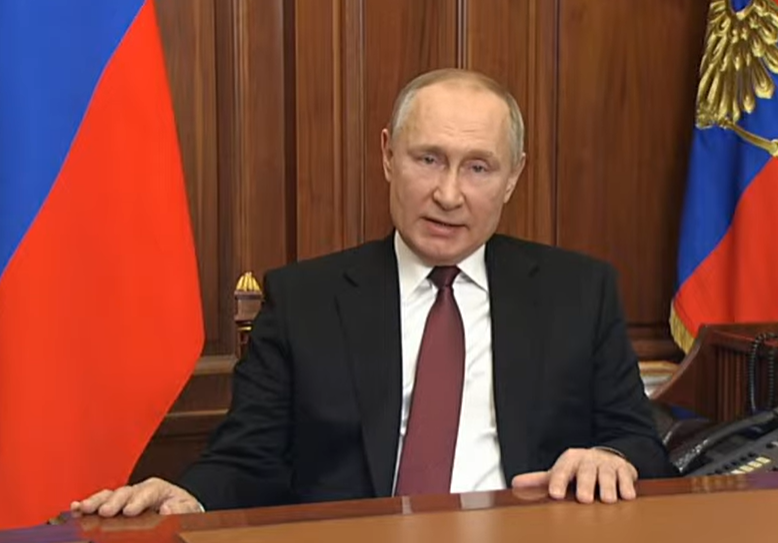
Putin had a good reason to believe so. Indeed, in 2014 Russian regulars ("ихтамнеты" = "there aren't any of them there") easily destroyed Ukrainian forces in Debaltsevo and Ilovaysk. He saw that Ukrainian army is weak and he can easily route them simply sending Russian regulars 

Strategically speaking Putin fucked up. He defeated Ukraine, inflicted pain and humiliation. Anyone with an IQ above the room temperature knew the war is not over and Russians would strike again. But - Putin didn't finish Ukraine back then. He thought he'd always have a chance 
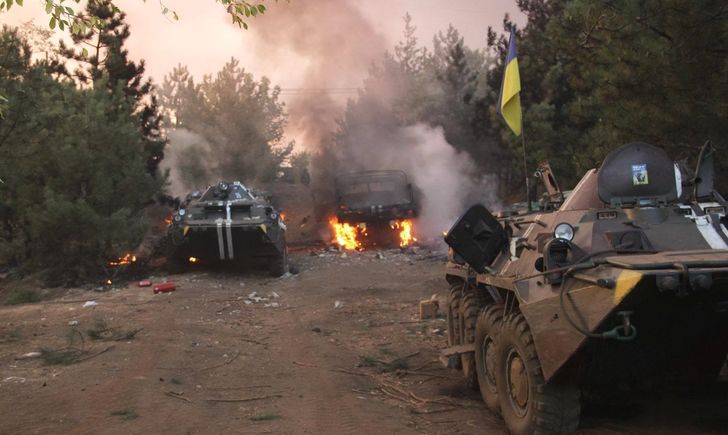
What happened next was quite predictable. Inflicting a painful but not critical defeat on your enemy is risky. Yeah, they kinda became weaker. But the balance of power within them changed. Court politics maxing interest groups lost and efficiency maxing upstarts get a chance 
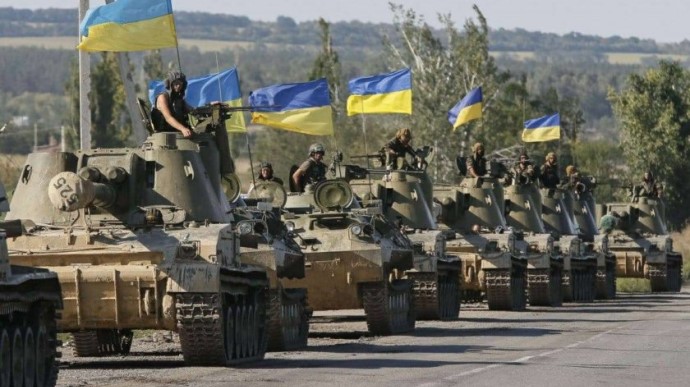
Formula of institutional evolution = scare + don't finish them. Napoleon smashed Prussians at Jena-Auerstedt, didn't finish them. Prussia evolved. Commodore Perry scared Japanese in 1853, but the US spiralled into Civil War and left them alone. Japan evolved 

Nothing motivates as hard as an existential threat. First, Ukrainians admitted the truth:
«I'll be frank. Today we have no army. Now we can assemble a group of 5 thousand capable soldiers max [out of 125 on paper]"
- reported minister of defence in 2014
«I'll be frank. Today we have no army. Now we can assemble a group of 5 thousand capable soldiers max [out of 125 on paper]"
- reported minister of defence in 2014
I'll make a pause, gonna resume in an hour or so. To be continued soon
In 2014 Ukrainian equipment was awful. Almost 100% vehicle and ammunition were 25+ year old Soviet stocks. Moreover, most of it just expired. Like vehicles existed on paper but were never checked or used since 1991. Their radiators, accumulators all rotten and unrepairable
FSB colonel who led pro-Russian insurgency in 2014 admitted it created problem for him, too. He wanted to restock from the Ukrainian military warehouses, but that stuff just didn't work. Like they took 28 anti-tank missiles and fired them all during Nikolaevka battle. None worked 
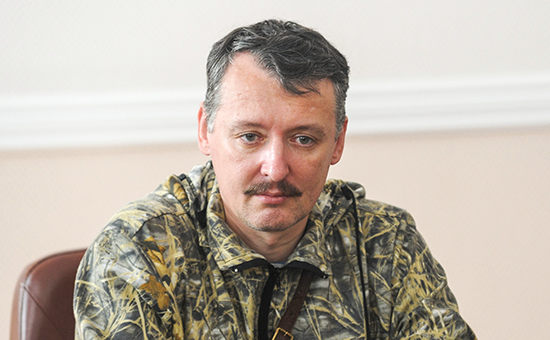
Judging by the interviews with insurgents who were disappointed to find that rockets, shells, grenades taken from Ukrainian warehouses were 99% dysfunctional (ofc, they were 25+ years old) it's not surprising Ukraine lost to Russia in 2014. It's surprising they could fight at all
Even the ancient soviet radio machines didn't work. Ukrainian soldiers had to communicate with SMS and since network was often awful they had to throw their mobile phones up in air in a hope may be it will catch radio signal few meters over the ground
That's how Ukrainian army looked back then. No wonder it was immediately crushed by Russian regulars in Debaltsevo and Ilovaysk and Putin had every reason to believe that resistance will be broken the moment he launches his regular army en masse
A lot has changed. First, Ukraine has had six drafts. Men were drafted and sent to Donbass. Then most demobilised and returned to civilian life. This Donbass contingent was around 60 thousand soldiers and constantly rotated. So now Ukraine has 400 000+ veterans of Donbass war
Many of them were in combat. Thus Ukraine has huge number of veterans with combat experience. Probably more than Russia. Yes, Russia has been fighting in Syria. It never published the size of its force but it's estimated to be 2-3 thousand. Most Russian soldiers have not seen war
Furthermore, combat they've seen is different. Russian soldiers are used to fighting only when they total superiority. In Syria they would just level cities to the ground with bombers. Meanwhile, Ukrainian soldiers have fought only against far stronger and better equipped enemy
Equipment-wise this war took Ukrainian army half-resupplied. It developed many innovative weaponry of its own, but almost none of it was produced on large scale. In most cases soldiers have only few prototypes of new, Ukrainian-produced weaponry
Ukraine ordered 48 Turkish Bayraktars TB2 drones. That's not bad - more than twice what Azerbaijan had in Karabakh. But only 12 of them got to the troops by now. Ukraine is also developing new, stronger drone Bayraktar Akinci together with Turks, but it's too late for this war 
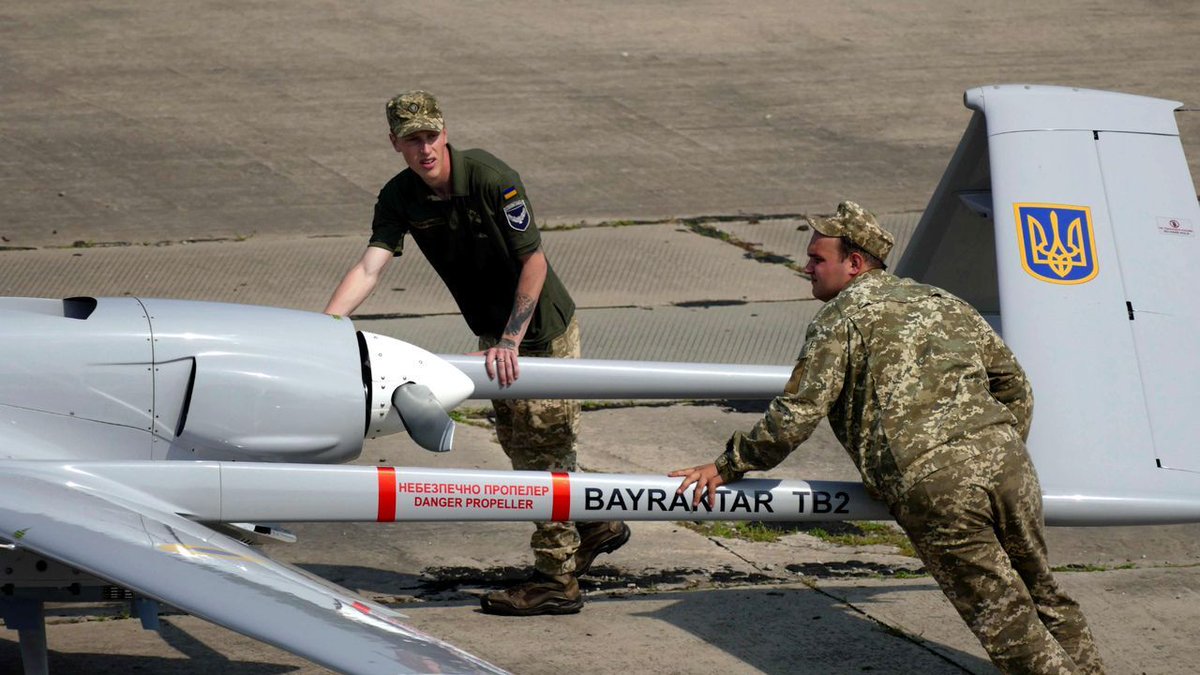
However, Ukrainians got a number (unpublished) of American-produced Javelins and M141 Bunker Defeat Munition, & British-Swedish produced MBT LAWs. Together with Ukrainian produced anti-tank weaponry such as «Stugna-P», RK-3 "Corsar" and «Barrier» it helps to fight Russian tanks 
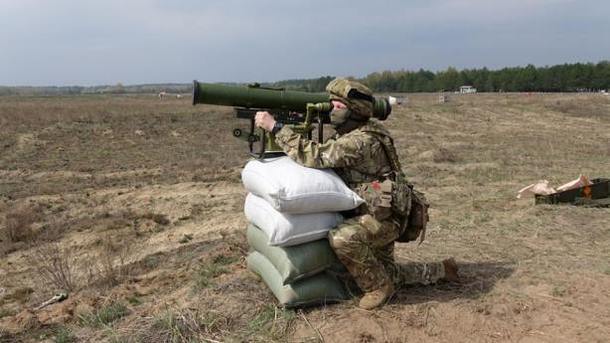
Ukrainian troops hadn't received many new tanks by the time Putin attacked. But they got new armoured vehicles, such as domestic-produced Cossack-2 with Turkish produced Aselsan fighting modules and a number of American armoured vehicles, humvees, etc 
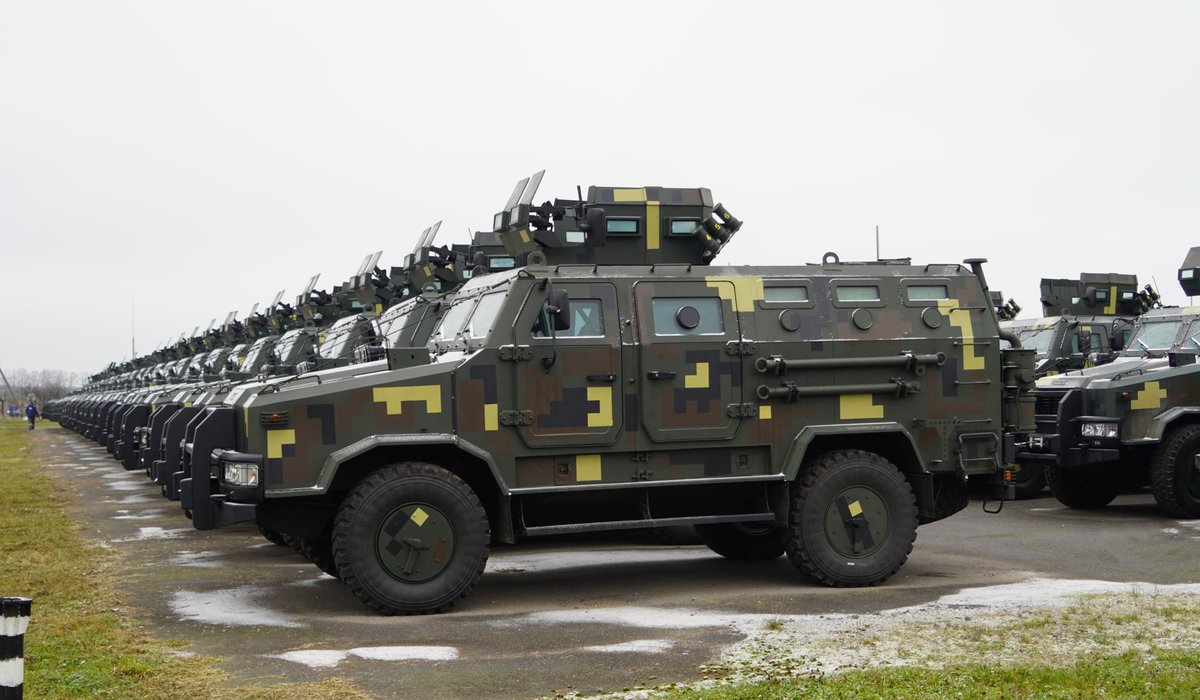
Finally, Ukraine created a new type of troops - the troops of territorial defence, whose number is estimated in 60 000. It's a copy of the Polish troop type. These are civilians who get military training and can be mobilised in a day to fight only in their own town and region 

Why? Well, that's pretty obvious. If Russia made a proper Blitzkrieg with several echelons of attack, Ukraine would lose anyway. But Russia didn't. And Ukrainians bet that they wouldn't. First - it's costly and difficult for a state security regime which isn't landmaxing
Second, Putin expected Ukrainian army to run away or surrender in the first day. Like most of foreign observers expected. Now they're of course changing the narrative, but if you look at their posts few days ago they didn't believe that Ukrainians would make any real resistance
So Putin attacked with only one echelon. Troops pushed forward leaving many non-destroyed Ukrainian regulars and levy behind. In a proper Blitzkrieg a second and third echelon would have come to finish Ukrainian defenders. But they didn't. These additional echelons didn't exist 
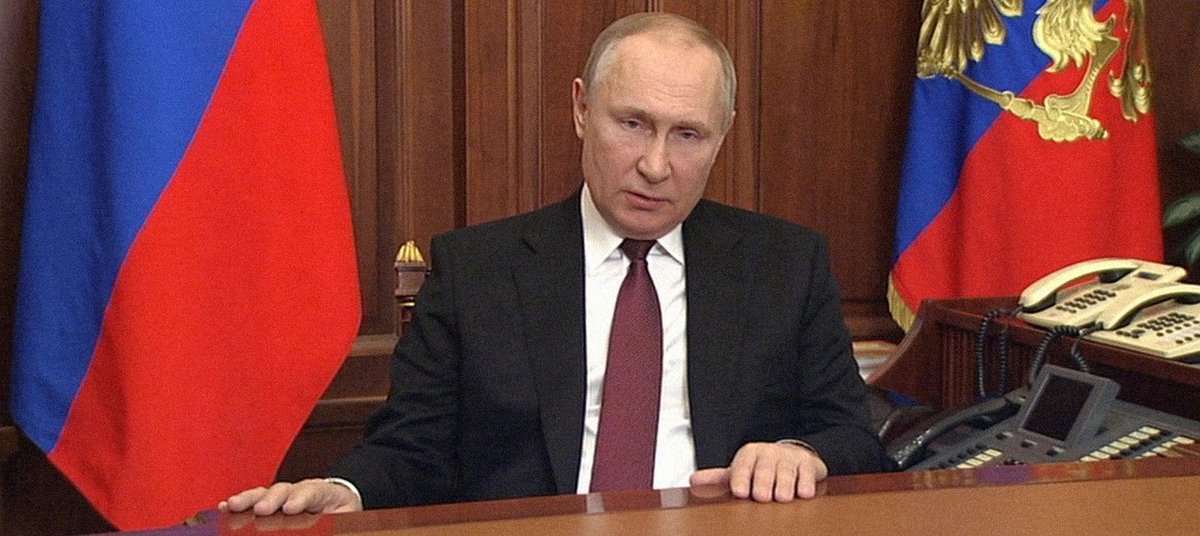
Which immediately created the supply and replenishment problem. The first echelon pushed forward. It needs a supply in ammo, in fuel and well, in people. But these supply convoys are being attacked by the regulars and territorial defence troops left behind
By those few Bayraktars Ukraine got
And reportedly by the levy whom the government just distributed guns. These people would be unable to stand against the Russian columns but they can attack convoys. Consider that Ukraine has many veterans with combat experience among civilians
Strelkov, who led pro-Russian insurgency in 2014 confirms this version in his telegram. Supply columns are being destroyed because there's no second echelon 

Putin is apparently concerned. In the video of 25 Feb he called for Ukrainian military to do a coup d'erat. He wouldn't need it if his plan worked in the first place 
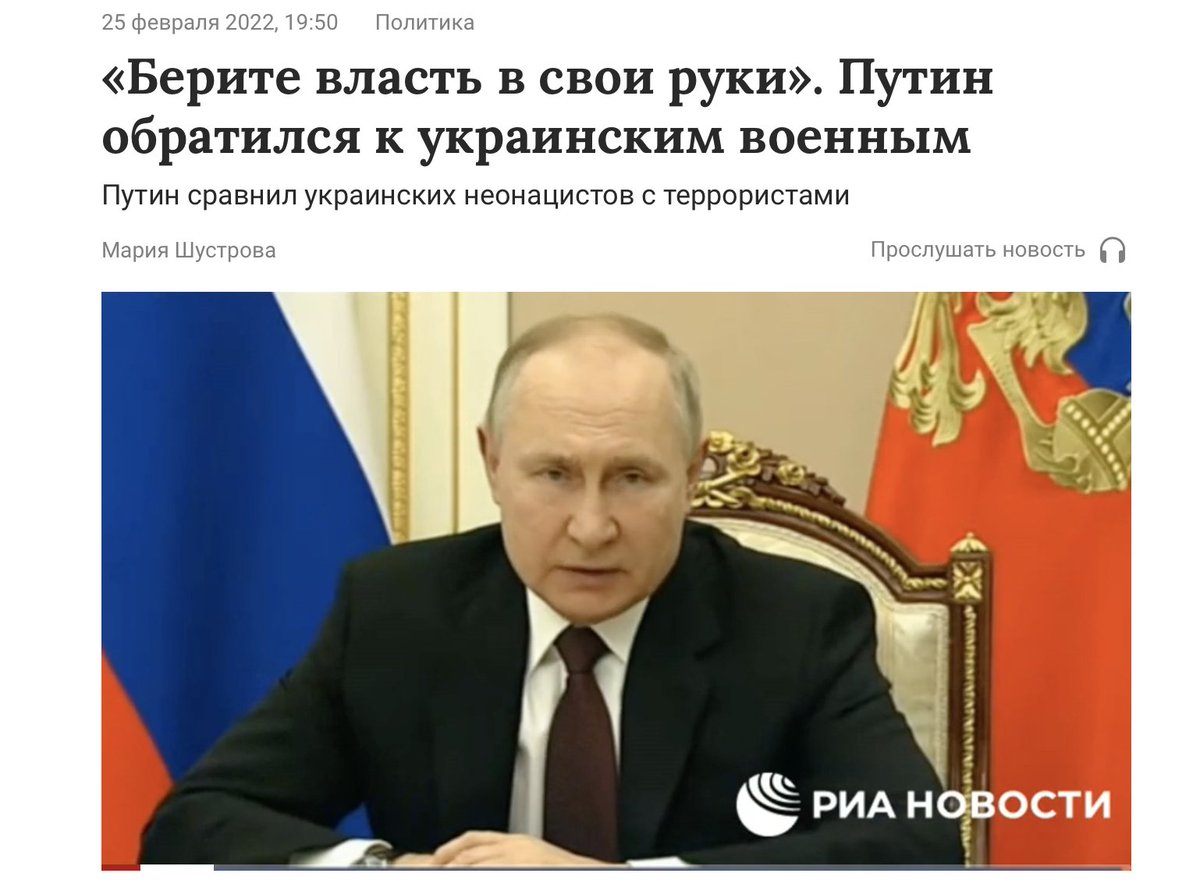
What does it mean? Putin's plan didn't work. Cuz he didn't plan for war. He never fought a war and has no idea how to fight them. He has been always doing Special Operations and this is a Special Operation, too. They should have just run away or surrender, but they keep fighting
The defeat in this operation will inflict enormous consequences for Putin and his regime. They are unlikely to survive this defeat. Meanwhile, it's unlikely that Putin wins by the same methods
It's not that Russian morale is low, it's rather that it depends on how hard the war is.Most Russian troops would be enthusiastic or wouldn't mind against a small foreign vacation with fun and adventures. Fighting a hard long war with real possibility of death is another matter
Now my laptop died and wouldn't turn on again, so typing from phone
Morale of Russian troops is widely overestimated. According to sociological studies the main motivation to enlist is usually to get an apartment. They are usually young men from underprivileged background with no real prospects in life. That's a chance to get a housing from state
Now if you are dead, you can't get a housing. Perhaps those already in Ukraine have little choice but the very fact that resistance continues, war is bloody and casualties are real would hugely demotivate those back at home. Expect no enthusiasm to go there on Russian side
What Putin can do?
1. Start destroying infrastructure (done)
2. Blockade cities (done)
3. Simply level cities with bombers and artillery like in Chechnya or Syria (may be)
The first two would inflict humanitarian catastrophe and as he hopes break the will
1. Start destroying infrastructure (done)
2. Blockade cities (done)
3. Simply level cities with bombers and artillery like in Chechnya or Syria (may be)
The first two would inflict humanitarian catastrophe and as he hopes break the will
Third one is more problematic. Unlike Chechnya or Syria where you could easily justify the open genocide with "fighting jihadees" which is a fair play in the "war on terror", here it would be more difficult and actually might draw the NATO response. Still, I can't exclude this
So my prognosis is: if the fight continues and victory is not achieved Russian ability and willingness to fight will be disappearing quickly. Putin doesn't have a choice but many of his subordinates do
Even in case when Russia doesn't technically lose and some source of armistice/agreement is achieved, Ukraine already won. Why? Many describe this conflict as kinetic. Bullshit. Human conflicts or interactions are not kinetic. They are mythological and run by myths
Money is a myth. It exists only because we believe so. Power is a myth. Nation is a myth. Institutions are purely mythological. Consider the story of the burning of Moscow in 1572. Ivan the Terrible divided his country to Zemschina (land) and Oprichnina (taken apart)
Oprichnina was under his personal rule. Oprichniks - his forces - launched terror campaign against Zemschina. They slaughtered entire noble houses, massacred cities, killed enormous number of commoners facing no resistance. Why? Were they strong and brave? No. Because if the myth
Russian people existed within a myth of Orthodox monarchy. Ofc there would be individuals who would go against the Orthodox Tsar. But it was impossible to organise a resistance against him. Thus resistance would be individuals and easily crushed by organised Oprichnik forces
Oprichniks became very brave and badass. Because mythology of the Russian people prohibited 99% of them to resist these security forces. So with the time they decided they are really cool. In 1572 when Crimean Khan attacked Moscow Oprichnik forces went to face him
Kinetically speaking they had overwhelming superiority. Guns, cannons, much heavier armor or weaponry. Their defense and firepower was very much stronger. But they were routed in one day simply by arrows. Because they were used to fight people whose myth prohibited to resist them
Within the Muscovite mythology Oprichniks were invincible untouchable demigods, as hands of Orthodox Tsar, who's kinda living God. But when facing foreign enemy they left this mythological space. And entered a new space where they are just people and can get arrow in the face
They were not used to getting arrows in the face. The very realisation they are not demigods but mortals shocked them. They ran away dropping their armor, guns and cannons. Moscow was burnt to the ground despite having total "kinetic" and technological superiority
So. Power is mythological. Russian state security are gods within their own mythological space where they represent the god like state. But what they found that Ukrainians left this mythological space. Thus Russian state security has no power there. They are just mortals
And finally. The very fact of resistance against so much superior enemy very much empowers the Ukrainian mythology. It's enormous mythos building we are witnessing. The very phenomenon of war is inconceivable without taking into account mythological dimension
Consider Venice. When Napoleon came they surrendered without a shot. Very smart, saved lives, saved the city. It's just killed the mythos of Venice. People lived but the Republic died. It was never restored and is unlikely to be restored again
Theorists of war of the bygone age understood it. Clausewitz pointed out that it's important not only if you lost independence but *how* you lost it. If you submitted without a fight, you saved lives. But you killed your mythos. You'll be digested by the conqueror
But if you lost after the brutal and bloody fight your mythos is alive. The memory of the last battle will live through the ages. It will shape the mythological space your descendants live in and they'll attempt to restore independence at the first opportunity. End of thread
@threadreaderapp unroll
• • •
Missing some Tweet in this thread? You can try to
force a refresh





